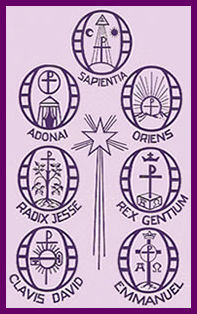.jpg)
December 18! For most of us, it's just a week before Christmas. For those who did their homework, today was
the feast of the Expectation of the Blessed Virgin, one of the lesser-known Marian feasts and one which was unfortunately suppressed in the new rite. But for the Mozarabic Rite, this day meant something more: it's the feast of the Annunciation.
Well actually, it was actually one of two such feasts in the old form. The Mozarabic feastday commemorating the Lord's incarnation fell on this day, one of the feasts that fell within Mozarabic Advent
*; the
Missale Mixtum actually had both the Roman date and the Mozarabic date marked as the feast of the Annunciation, with the December date officially tagged as
In Festivitate Annunciationis sancte Marie Virginis, que dicitur de la O ("in the feast of the Annunciation of the holy virgin Mary, which is called 'of the O'"). For the record, the new form of the rite has dropped the Roman date and keeps only the December feast.
The Catholic Encyclopedia says thus on its article of the
Expectation:
Owing to the ancient law of the Church prohibiting the celebration of feasts during Lent (a law still in vigour at Milan), the Spanish Church transferred the feast of the Annunciation from 25 March to the season of Advent, the Tenth Council of Toledo (656) assigning it definitely to 18 December. It was kept with a solemn octave. When the Latin Church ceased to observe the ancient custom regarding feasts in Lent, the Annunciation came to be celebrated twice in Spain, viz. 25 March and 18 December, in the calendars of both the Mozarabic and the Roman Rite (Missale Gothicum, ed. Migne, pp. 170, 734). The feast of 18 December was commonly called, even in the liturgical books, "S. Maria de la O", because on that day the clerics in the choir after Vespers used to utter a loud and protracted "O", to express the longing of the universe for the coming of the Redeemer (Tamayo, Mart. Hisp., VI, 485). The Roman "O" antiphons have nothing to do with this term, because they are unknown in the Mozarabic Rite. This feast and its octave were very popular in Spain, where the people still call it "Nuestra Señora de la O".
In simple words: Because of the widespread custom of banning feastdays in Lent (since Lent is supposed to be a time of penitence), the church in Spain, just to play it safe, moved the commemoration of the Annunciation towards Advent, and later definitively in December 18 - a week before Christmas. Then ages later, when the custom was laxed, the Spanish church finally readmitted the March 25 feast; the problem is, since people are now attached to the December 18 date (with it now becoming a tradition of the Spanish church) it was decided that the two feasts just be kept together, producing two feastdays in the calendar which commemorate the same event.
Another Western rite which celebrates the Annunciation in a different date than most of Christendom is the
Ambrosian Rite of Milan, which has it on the Sixth Sunday of Advent "
for, since no fixed festivals are kept during Lent or Easter Week, it cannot be properly celebrated on 25 March, though it is found there in the Calendar and has an Office in the Breviary." There were two Masses for that day - one for the Sunday itself and one for the Incarnation feast proper.
* It also might be interesting to mention that there are SIX Sundays of Advent in the Mozarabic Rite (like the Ambrosian), as opposed to the Roman four.
 From lands that see the sun arise,
From lands that see the sun arise,




.jpg)


